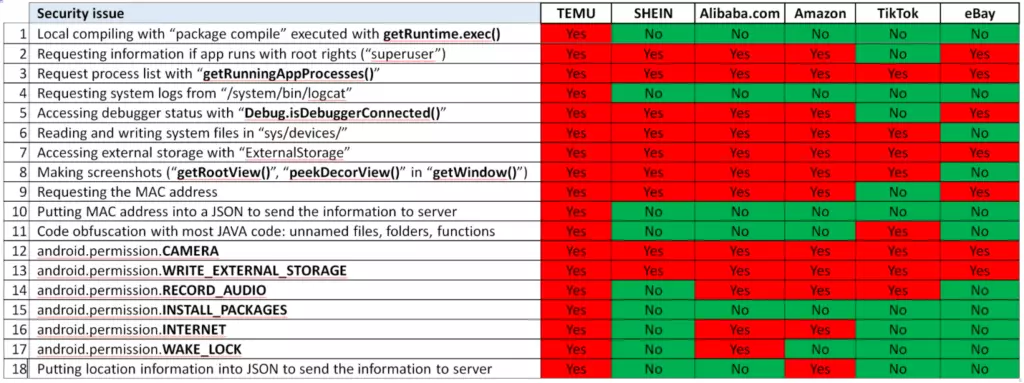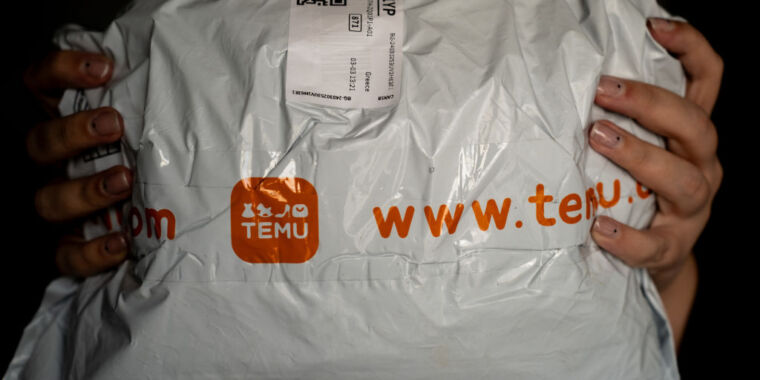“Temu is designed to make this expansive access undetected, even by sophisticated users,” Griffin’s complaint said. “Once installed, Temu can recompile itself and change properties, including overriding the data privacy settings users believe they have in place.”
That’s just nuts
Yeah, it is. It’s such an extraordinary claim.
One requiring extraordinary evidence that wasn’t provided.
“It’s doing amazing hacks to access everything and it’s so good at it it’s undetectable!” Right, how convenient.
This is why companies like Apple are at least a tiny bit correct when they go on about app security and limiting code execution. The fact it aligns with their creed of controlling all of the technology they sell makes the whole debate a mess, though. And it does not excuse shitty behavior on their part.
But damn
And if they got this past Apple in their platforms. That’s even wilder.
The article linked to the analysis and on a quick glance, it seems to be done entirely against the Android variant of the app. This makes sense because if the alleged actions are true, they’d never have gotten on to the App Store for iOS Apple users… or at least as of a couple months ago. Who knows what kind of vulnerability is exposed by Apple only doing limited cursory checks for 3rd party App Stores.
deleted by creator
I’m sure Temu collects all information you put into the app and your behaviour in it, but this guy is making some very bold claims about things that just aren’t possible unless Temu is packing some serious 0-days.
For example he says the app is collecting your fingerprint data. How would that even happen? Apps don’t have access to fingerprint data, because the operating system just reports to the app “a valid fingerprint was scanned” or “an unknown fingerprint was scanned”, and the actual fingerprint never goes anywhere. Is Temu doing an undetected root/jailbreak, then installing custom drivers for the fingerprint sensor to change how it works?
And this is just one claim. It’s just full of bullshit. To do everything listed there it would have to do multiple major exploits that are on state-actor level and wouldn’t be wasted on such trivial purpose. Because now that’s it’s “revealed”, Google and Apple would patch them immediately.
But there is nothing to patch, because most of the claims here are just bullshit, with no technical proof whatsoever.
Yeah, I don’t like Temu, and I’m sure the app is a privacy nightmare, but these claims don’t seem right. If it’s true, I’d like to see someone else verify it.
The article links to this as technical proof https://grizzlyreports.com/we-believe-pdd-is-a-dying-fraudulent-company-and-its-shopping-app-temu-is-cleverly-hidden-spyware-that-poses-an-urgent-security-threat-to-u-s-national-interests/
There’s analysis of decompiled source code.
The analysis shows it’s spyware, which I don’t question. But it’s spyware in the bounds of Android security, doesn’t hack anything, doesn’t have access to anything it shouldn’t, and uses normal Android permissions that you have to grant for it to have access to the data.
For example the article mentions it’s making screenshots, but doesn’t mention that it’s only screenshots of itself. It can never see your other apps or access any of your data outside of it that you didn’t give it permission to access.
Don’t get me wrong, it’s very bad and seems to siphon off any data it can get it’s hands on. But it doesn’t bypass any security, and many claims in the article are sensational and don’t appear in the Grizzly report.
That is not entirely correct. The reported found the app using permissions that are not covered by the manifest. It also found the app being capable to execute arbitrary code send by temu. So it cannot be clearly answered if the app can utilize these permissions or not. Obviously they would not ship such an exploit with the app directly.
The reported found the app using permissions that are not covered by the manifest.
It didn’t found them using them, it’s an important distinction. It found code referring to permissions that are not covered by the Manifest file. If that code was ran, the app would crash, because Android won’t let an app request and use a permission not in the Manifest file. The Manifest file is not an informational overview, it’s the mechanism through which apps can declare permissions that they want Android to allow them to request. If it’s not in the Manifest, then it’s not possible to use. It’s not unusual to have a bunch of libraries in an app that have functionality you don’t use, and so don’t declare the required permissions in the Manifest, because you don’t use them.
It also found the app being capable to execute arbitrary code send by temu.
Yeah, which is shady, but again, there is nothing to indicate that code can go around any security and do any of the sensational things the article claims.
The Grizzly reports shows how the app tricks you into granting permissions that it shouldn’t need, very shady stuff. But it also shows they don’t have a magical way of going around the permissions. The user has to actually grant them.
I agree on the sensationalism in the article.
The study and evidence was already provided months ago
This was also linked in the article if you read it
Here’s the actual relevant part


These are security risks to be sure, and while these permissions are (mostly) on the surface, possibly defensible, together they do clearly represent an app trying to gather all of the data that it can.
However, a lot of info from this report is overblown. For example code compilation is sketchy to be sure, but without a privilege escalation attack, it can’t do anything the app couldn’t do with an update.
Also, there’s some weird language in the report, like counting the green security issues in other apps (like tiktok) as if they were also a problem, despite the image showing that green here means it doesn’t present that particular risk.
All of this to say, if you have temu, probably uninstall it. It’s clearly collecting all the data it can get.
But it’s unlikely to be the immediate threat that will have China taking over your phone like this report implies.
This infographic is really helpful. Stuff like this makes me relieved I use the majority of services in a browser, rather than native apps
Exactly why I use browser and not apps, too. and if they try to strongarm me with better prices or degraded services, I just stop using them all together.
It’s why I stopped using Reddit on mobile lol. No, I don’t want to download your official app, and no you making it so I need it to access NSFW stuff will convince me to.
Same with X/Twitter. I hate when people put information in those now because you can’t read more than one at a time in some reply to self thread on there without downloading the app. Especially when it’s important news or on the ground reporting. Screw that. All those reporters need to use mastadon.
Shocked i tell you. I am shocked.
No way an app would collect data it doesnt need. Preposterous.
Next thing you’ll tell me is that tiktok is doing the same thing!
What about Meta and Google?
Them too, but lukewarm by comparison.
Erm, WhatsApp would suggest otherwise.
WhatsApp was the vector for zero click access to a target’s phone from Israel’s weapons grade hacking Pegasus toolkit. They would send a video call, typically in the middle of the night, and with no input from the used they’d get full access. My personal belief is that they used functionality WhatsApp itself uses to access user data.
There was also an encrypted phone called ANOM, which had this trick calculator app with a hidden encrypted messager. “Made for criminals, by criminals”. Except, when the guy started his business he got investment from the FBI and Australian Federal Police to pay for the servers and some of the phones themselves. Basically every time it sent an encrypted message it sent a separate encrypted message to the ANOM servers. It’s entirely possible (perhaps even likely) that WhatsApp would do this also.
As for Google, they’re truly insidious. Lots of banks now require you to connect to Google captcha servers - they don’t give you the pictures, it’s just the back end, basically the tracking parts. Then there’s the controversy about them collecting location data when users have said no. They absolutely do collect data they shouldn’t.

The irony
That’s what you get for using a proprietary Lemmy app. Switch to Thunder, it doesn’t have ads, it’s open source and in my opinion has the best UI out of all Lemmy apps. Also support the development and join their community: [email protected]
Jerboa here but same
I tried using Jerboa and found it to be incredibly buggy and poorly designed. Not sure what’s going on there, considering that it’s the official mobile app made by the Lemmy devs
Has worked mostly fine for me, YMMV










